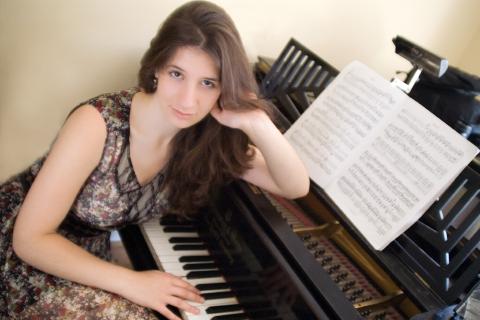|
<<< << -- 3 -- Malcolm Troup AN EXTRAORDINARY SHOWCASE -- >> >>>

On Tuesday we were met with the spectacle of a one-time Wunderkind and scion of a distinguished family, fifteen-year-old Evelyne Berezovsky, who has gone on to fulfil her promise to the world and (to paraphrase Goethe) is now waiting for the world to catch up. She was keen to establish her credentials in Bach-, Beethoven-, Schubert-, Chopin- and Scriabin-playing even if it meant squeezing a quart into the pint-pot of her lunchtime recital. And prove herself she did magnificently as a tribute to her Purcell School teacher, Ilana Davids, and to the Russian school of pianism to which she belongs by right of her Moscow birth. What still remains for this dedicated young artist is to make her own all those interpretive and technical niceties of which she has been on the receiving end until now.
Communication in her case is the name of the game -- not only to be content with serving as a transmitting-station for the music she plays so effortlessly but to contribute actively to its communicative projection. She came closest to this in her Schubert though even here the first movement could have been a shade less hurried and allowed to breathe more -- making music as the thoroughbred performer she already is rather than simply running the course. The slow movement, in its pristine simplicity, seemed to release a more personal note in her which all the technical demands of fleetness and finish had until then largely obscured from view. No doubt she is destined to achieve a great career but if she aspires to greatness as a performer she must find herself first and fight to make her own what she now holds on trust. No need to worry unduly on this score because that is exactly the price which puberty will exact from her -- making her question and revalidate for better or worse all her 'received' ideas.

Evelyne Berezovsky
|
Otherwise her playing was always ingratiatingly fluent and mellifluous, the reward of a relaxed technique which never sought more from the instrument than it was capable of giving. One could have wished for a sharper focus to the Bach, however well-articulated her well-schooled fingers, and some real drama in the Beethoven where the high points were often underplayed. Sometimes one caught oneself wishing that the 'rough edges' had not been so diligently smoothed away. Her Chopin had the 'feminine' character previously attributed to this composer (and from which Jan Ekier did so much to redeem him) -- partly because of her lack of real volume in opening up the sound when the moments came, for which she compensated with speed, accuracy and pedalling which go only so far. Similarly, the brilliant second of her two Scriabin etudes, which were perhaps meant for us in lieu of encores, called for a power that is not yet hers to give but which is only a question of time.
Continue >>
Copyright © 15 August 2007
Malcolm Troup, London UK

|

